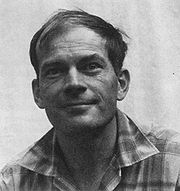
Robert MacArthur
Encyclopedia

United States
The United States of America is a federal constitutional republic comprising fifty states and a federal district...
ecologist
Ecology
Ecology is the scientific study of the relations that living organisms have with respect to each other and their natural environment. Variables of interest to ecologists include the composition, distribution, amount , number, and changing states of organisms within and among ecosystems...
who made a major impact on many areas of community and population ecology
Population ecology
Population ecology is a sub-field of ecology that deals with the dynamics of species populations and how these populations interact with the environment. It is the study of how the population sizes of species living together in groups change over time and space....
.
MacArthur received his Bachelor's degree from Marlboro College
Marlboro College
Marlboro College is a small, coeducational, alternative liberal-arts college in Marlboro, Vermont, USA.-History:Marlboro College was founded in 1946 by Walter Hendricks for returning World War II veterans on Potash Hill in Marlboro, Vermont. The school's operation was initially financed using money...
, a Master's degree in mathematics from Brown University
Brown University
Brown University is a private, Ivy League university located in Providence, Rhode Island, United States. Founded in 1764 prior to American independence from the British Empire as the College in the English Colony of Rhode Island and Providence Plantations early in the reign of King George III ,...
(1953). A student of G. Evelyn Hutchinson
G. Evelyn Hutchinson
George Evelyn Hutchinson FRS was an Anglo-American zoologist known for his studies of freshwater lakes and considered the father of American limnology....
, MacArthur earned his Ph.D. from Yale University
Yale University
Yale University is a private, Ivy League university located in New Haven, Connecticut, United States. Founded in 1701 in the Colony of Connecticut, the university is the third-oldest institution of higher education in the United States...
in 1958; his thesis was on the division of ecological niche
Ecological niche
In ecology, a niche is a term describing the relational position of a species or population in its ecosystem to each other; e.g. a dolphin could potentially be in another ecological niche from one that travels in a different pod if the members of these pods utilize significantly different food...
s among five warbler species in the conifer forests of New York. He was a professor at the University of Pennsylvania
University of Pennsylvania
The University of Pennsylvania is a private, Ivy League university located in Philadelphia, Pennsylvania, United States. Penn is the fourth-oldest institution of higher education in the United States,Penn is the fourth-oldest using the founding dates claimed by each institution...
, 1958-65, and professor of biology at Princeton University
Princeton University
Princeton University is a private research university located in Princeton, New Jersey, United States. The school is one of the eight universities of the Ivy League, and is one of the nine Colonial Colleges founded before the American Revolution....
, 1965-72. He played an important role in the development of niche partitioning, and with E.O. Wilson he co-authored The Theory of Island Biogeography
The Theory of Island Biogeography
The Theory of Island Biogeography is a 1967 book by Edward O. Wilson and Robert MacArthur which laid the foundations for the study of island biogeography. An edition with a new preface by Edward O. Wilson was published in 2001 ....
, a work which changed the field of biogeography
Biogeography
Biogeography is the study of the distribution of species , organisms, and ecosystems in space and through geological time. Organisms and biological communities vary in a highly regular fashion along geographic gradients of latitude, elevation, isolation and habitat area...
, drove community ecology
Community (ecology)
In ecology, a community is an assemblage of two or more populations of different species occupying the same geographical area. The term community has a variety of uses...
and led to the development of modern landscape ecology
Landscape ecology
Landscape ecology is the science of studying and improving relationships between urban development and ecological processes in the environment and particular ecosystems...
. His emphasis on hypothesis testing
Statistical hypothesis testing
A statistical hypothesis test is a method of making decisions using data, whether from a controlled experiment or an observational study . In statistics, a result is called statistically significant if it is unlikely to have occurred by chance alone, according to a pre-determined threshold...
helped change ecology from a primarily descriptive field into an experimental field, and drove the development of theoretical ecology
Theoretical ecology
Theoretical ecology is the scientific discipline devoted to the study of ecological systems using theoretical methods such as simple conceptual models, mathematical models, computational simulations, and advanced data analysis...
.
At Princeton, MacArthur served as the general editor of the series Monographs in Population Biology, and helped to found the journal Theoretical Population Biology. He also wrote Geographical Ecology: Patterns in the Distribution of Species (1972). He was elected to the National Academy of Sciences
United States National Academy of Sciences
The National Academy of Sciences is a corporation in the United States whose members serve pro bono as "advisers to the nation on science, engineering, and medicine." As a national academy, new members of the organization are elected annually by current members, based on their distinguished and...
in 1969. Robert MacArthur died of renal cancer
Renal cell carcinoma
Renal cell carcinoma is a kidney cancer that originates in the lining of the proximal convoluted tubule, the very small tubes in the kidney that filter the blood and remove waste products. RCC is the most common type of kidney cancer in adults, responsible for approximately 80% of cases...
in 1972.

